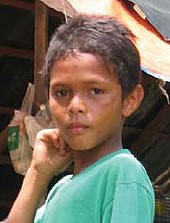Jakun, Djakun in Malaysia

Photo Source:
Copyrighted © 2026
Southeast Asia Link - SEALINK All rights reserved. Used with permission |
Send Joshua Project a map of this people group.
|
| People Name: | Jakun, Djakun |
| Country: | Malaysia |
| 10/40 Window: | Yes |
| Population: | 35,000 |
| World Population: | 35,000 |
| Primary Language: | Jakun |
| Primary Religion: | Ethnic Religions |
| Christian Adherents: | 0.00 % |
| Evangelicals: | 0.00 % |
| Scripture: | Portions |
| Ministry Resources: | No |
| Jesus Film: | Yes |
| Audio Recordings: | No |
| People Cluster: | West Malaysia Indigenous |
| Affinity Bloc: | Malay Peoples |
| Progress Level: |
|
Introduction / History
The Jakun are the second largest of the nineteen Orang Asli people groups of Peninsular Malaysia. They are part of the Aboriginal Malay (officially called Proto-Malay) subgroup.
The Jakun are believed to have lived in the Peninsula for 7,000 years. The Department of Orang Asli Affairs labels them Orang Hulu (People of the Upriver), a term which the Jakun refer to themselves.
The major Malay attitude towards the Jakun is of two minds. On one hand, they are considered less civilized and skilled in "black magic" (the word jakun is pejorative in Malay, implying an uncivilized person) while on the other they are regarded as proof that the country has always been inhabited by people of the Malay type (hence the more polite and official name Orang Asli or "original people"). Jakun settlements can be found in the Malaysian states of Johor and Pahang. In the past, their settlements extended over a much larger area of the southern peninsula.
What Are Their Lives Like?
Traditionally hunter-gatherers, the Jakun are now more settled than most of Malaysia's Orang Asli groups. They live by setting fish traps in rivers and streams. They hunt game with blowpipes and poison darts and gather fruit and forest products for bartering.
In some areas the Jakun grow rice or tapioca root, but they often prefer to get these commodities, along with tobacco, gambier, and areca nut, from Malay and Chinese traders in exchange for rattan, wax, woods, resin, and camphor they gather in the forest. In many regions, the Jakun have followed a Malay way of life, growing fruit, rubber, and rice as well as rearing animals. It is difficult to say how many Jakun there are because they have been speaking Malay as their mother tongue for at least 200 years. The people group picture is complicated by the presence of several mixed tribes made up of people of different races. Jakun have intermarried with Malays, Chinese, Senoi, and Semang people. Several of them have become nominal Muslims - meaning that the government views them as Malays for census and legal purposes.
What Are Their Beliefs?
Apart from believing in the existence of spirits and supernatural beings, the Jakun also believe that a "god of the above" controls the skies while a "god of the lower" rules the earth. The Jakun bomoh or witchdoctor is both feared and respected in their society. He deals with the spirits in each Jakun village and is more influential than the village chief. If questioned on their religious beliefs, some Jakun who have considerable contact with the Malay people would say that their god is the Lord Allah, but there is no semblance of praying to Allah. Moreover, many are not Muslims in any other respect.
What Are Their Needs?
Many Jakun are in a state of transition. They have given up hunting and foraging for food for agriculture to survive. Some will need educational and agricultural assistance during this transition period. Pray that believers will be willing to make time and sacrifices to help the Jakun. Pray that they will relate and respond to all the needs of people.
Prayer Points
Pray for the Jakun culture to be renewed and enhanced by a work of the Holy Spirit and shaped into a God-centered and God-honoring mold.
Pray for the Holy Spirit to move among Jakun family and community leaders to seek His face and enjoy his blessings.
Pray for the Lord to thrust out workers who will be compelled to nurture a disciple making movement among the Jakun people.
Pray that soon the Jakun people will have faith that will lead them to live honorable lives that will draw others to the savior.